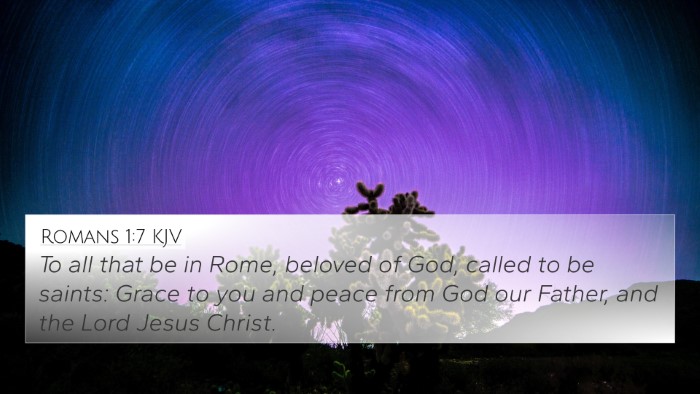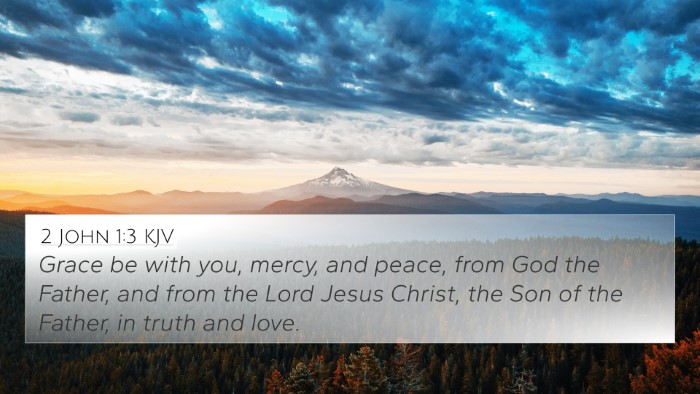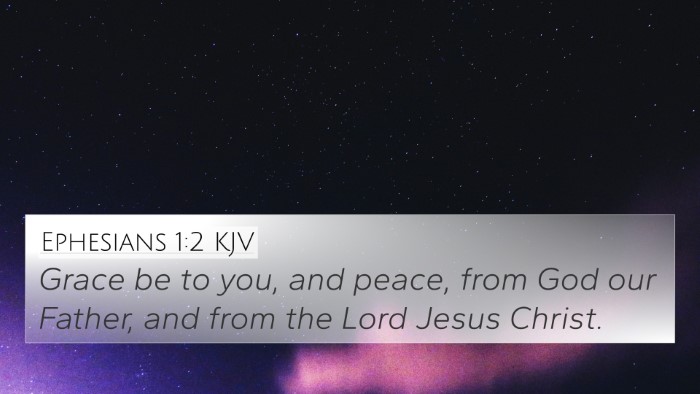Understanding Galatians 1:3
Galatians 1:3 states, "Grace to you and peace from God the Father and our Lord Jesus Christ." This verse captures a profound and foundational greeting typical in Pauline letters, establishing a context where grace and peace are blessings derived from a relationship with God and Christ.
This verse is essential for understanding the nature of Christian greeting and the theological implications behind grace and peace. Below, we delve into the meanings drawn from various public domain commentaries, including those by Matthew Henry, Albert Barnes, and Adam Clarke.
Commentary Insights
-
Matthew Henry:
Henry emphasizes the significance of grace, which is the unmerited favor of God. He posits that this grace is vital for all Christians as it underpins their relationship with God, enabling them to experience peace. He further asserts that it is through Jesus Christ that this grace and peace are obtained, shaping the believer’s identity and experience.
-
Albert Barnes:
Barnes outlines that the term "peace" refers not only to internal tranquility but also to harmony among believers. He highlights that peace is rooted in the work of Jesus Christ, who reconciles humanity to God. This further emphasizes the dual aspect of the Christian experience: grace as the foundation and peace as the resulting state of being.
-
Adam Clarke:
Clarke draws attention to the historical context, noting that the Galatian church faced significant challenges. He interprets this greeting as an assurance of divine benevolence, indicating that despite struggles, believers are reminded of the continual grace available through Christ. Consequently, this greeting serves to strengthen their faith in turbulent times.
Bible Verse Cross References
Galatians 1:3 may be better understood in connection with several other verses in the Bible, illustrating the theme of grace and peace:
- Romans 1:7: "To all that be in Rome, beloved of God, called to be saints: Grace to you and peace from God our Father, and the Lord Jesus Christ."
- 2 Corinthians 1:2: "Grace be to you and peace from God our Father, and from the Lord Jesus Christ."
- Ephesians 1:2: "Grace be to you, and peace, from God our Father, and from the Lord Jesus Christ."
- Philippians 1:2: "Grace be unto you, and peace, from God our Father, and from the Lord Jesus Christ."
- Colossians 1:2: "To the saints and faithful brethren in Christ which are at Colosse: Grace be unto you, and peace, from God our Father and the Lord Jesus Christ."
- 1 Thessalonians 1:1: "Paul, and Silvanus, and Timotheus, unto the church of the Thessalonians which is in God the Father and in the Lord Jesus Christ: Grace be unto you, and peace, from God our Father, and the Lord Jesus Christ."
- Hebrews 13:20-21: "Now the God of peace, that brought again from the dead our Lord Jesus, that great shepherd of the sheep, through the blood of the everlasting covenant, make you perfect in every good work to do his will."
Thematic Bible Verse Connections
The themes of grace and peace found in Galatians 1:3 resonate throughout the New Testament, particularly within the letters of Paul:
-
Connections to the Old Testament: The concept of peace (Hebrew "Shalom") is deeply rooted in the Old Testament, suggesting completeness and wholeness, which is fulfilled in the New Testament through Christ.
-
Comparative Analysis: Other Pauline epistles repeatedly echo this benediction, which serves to reinforce these ideas of divine favor and tranquility among faith communities.
Conclusion
Galatians 1:3 offers a concise yet profound greeting that captures the essence of Pauline theology—the nature of grace and peace available through Christ. This verse invites readers to explore deeper connections among various biblical texts, demonstrating the continuity of God’s grace across the scriptures. The impact of this verse extends beyond mere words; it cultivates an understanding of the foundational relationship believers have with God and each other, nourished by the peace of Christ.
Further Study and Application
For those interested in exploring these themes more fully, various tools for Bible cross-referencing can help deepen the understanding of similar and related scriptures. Utilizing a Bible concordance or a cross-reference Bible study guide can facilitate this exploration and strengthen one's theological insights.












